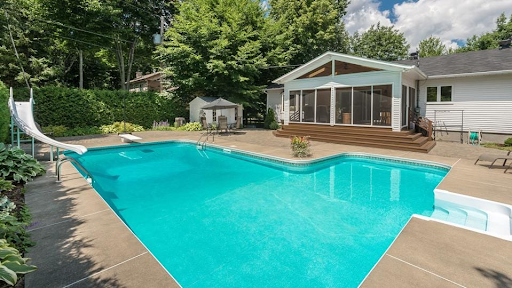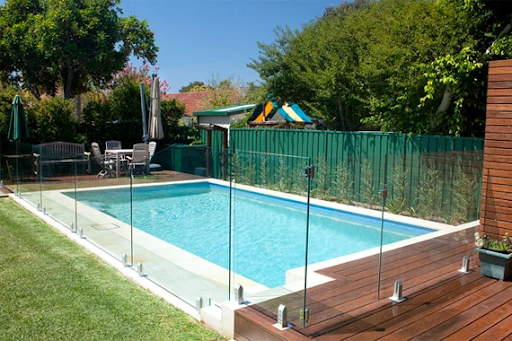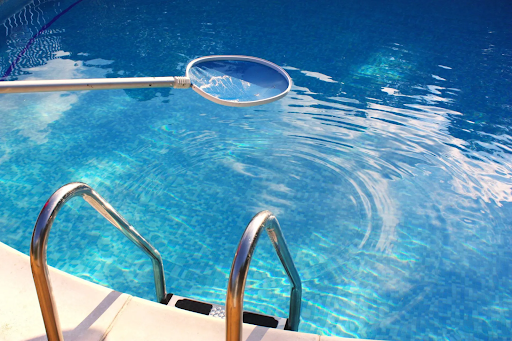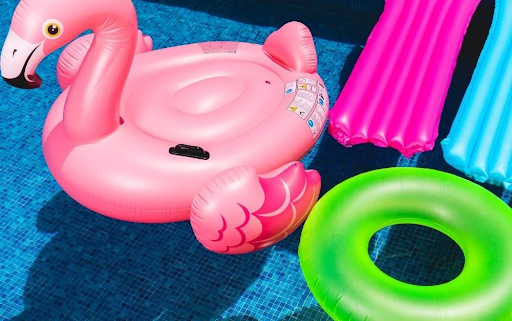
When we think of the arriving summer season, we might picture ourselves and our families lounging around or splashing in a swimming pool, having the time of our lives. Having a swimming pool in your house adds value to your property. It is basically an asset to your rental property. According to research, adding a swimming pool roughly increases the value of a property from 5 to 9 percent. Pools are the most lavish amenities to attract more and more tenants, especially in the Summer season, when people are looking for options for a short staycation with their family and friends. Therefore, a swimming pool would help you rent out your home faster than homes without it and generate more income, of course.
Is it a good decision to rent out your pool?
You are most probably familiar with people renting out their homes or tiny portions thereof. You may also know that people rent out their lawns and gardens for small events. Since the pandemic and many facilities being shut down, renting out swimming pools has also become a tradition. Though now, when most of the places are open, people still prefer to rent out home pools because of the convenience that comes along with it. At first glance, it is a win-win situation. You collect all the hefty income while not using your pool yourself, and you give a chance of a private swimming experience to the people who do not own a swimming pool. So, the answer is, of course, yes!
Things to know before renting out your swimming pool.
Renting your pool or your home with a swimming pool comes with some extra steps to take for property owners. Here are a few main things you should know before renting your property.
Homes with swimming pools bring risks.
If you own a property, you are solely responsible for keeping it in great shape and safe. Owning swimming pools at home adds one layer extra of risk and responsibility to your property. Therefore, there are a few things to consider before renting out your pool: health hazards, drowning, injuries, and other accidents that might happen while swimming. Safe and appropriate pool upkeep is essential to avoid these mishaps and prevent your tenants from getting into any such accidents. For example, you should regularly get your pool water tested for chlorine because excessive chlorine in the water may cause skin, lungs, and eye irritation. Less chlorine in the water gives algae and other microorganisms a great ground to grow!
You could be accountable for mishappenings.
Accidents happen. But, as a property owner, tenants would expect you to do all you can to make your swimming pool area as safe and secure as possible., or you could be simply held accountable. Here are a few ways that can be used for protection.
- Install pool safety features to prevent injuries.
- Understand the local and state laws to make your pool a safe zone. Talk to a professional to ensure you have all the information regarding your pool's safety.
- Have a signed pool waiver by your tenants.
- Be regular in your pool maintenance, even if it is not in use.
- Address your tenants' concerns in real-time, and take necessary measures.
- Hand out pool safety pamphlets to your tenants when they move in.
- Ensure that your insurance covers your swimming pool as well.
Install a pool barrier.

Many communities and states require fences around the pools or installing barriers to prevent accidental drowning. The fence around your swimming pool should be at least 4 feet tall. Consider installing barriers around all sides of the pool to make it a safe zone. This would help toddlers and underage children at bay from entering the pool area without supervision.
What about other pool safety measures?
Along with installing pool barriers, adding a pool cover as a safety precaution is also recommended. Pool covers that retract automatically or have latches provide better safety for pets and toddlers. You can also emphasise pool safety by putting up different caution boards with messages like "children must enter with adults at all times" or "no diving," etc. You should also keep an emergency safety kit prepared, including a first-aid box, life rings, and rescue tubes.
Regular maintenance and pool upkeep are necessary.
 Swimming pools require regular maintenance even if they are not in use. However, maintaining a pool is time-taking and costly. However, frequent pool upkeep includes:
Swimming pools require regular maintenance even if they are not in use. However, maintaining a pool is time-taking and costly. However, frequent pool upkeep includes:
- Skim your pool regularly to prevent debris accumulation.
- Vacuum the pool to keep the water squeaky clean.
- Check the chlorine levels regularly. Your pool should neither be over-chlorinated nor under-chlorinated.
- Also, clean the pool filters.
- Do your pool inspection frequently to make sure it is safe and in good shape.
- Clean the pool surrounding to make it look immaculate.
Your property's lease agreement should mention who would be doing the swimming pool maintenance. If you decide to do the task yourself or hire a professional, it may be costly. However, the best option is to have your tenants do the pool maintenance. But, you need to be careful as most tenants are not regular with the pool's upkeep.
Floats and other pool toys.
 If there is no barrier or fence installed by your swimming pool, offering pool toys and floats could be an alternative way to increase safety measures for your guests. For example, if someone from your tenants does not know how to swim, they can always take a little help with the floats, tubes, and pool toys to enjoy the water. However, along with leisure comes great responsibility. Ensure you provide your non-swimmer tenants with life-saving vests and other safety kits.
If there is no barrier or fence installed by your swimming pool, offering pool toys and floats could be an alternative way to increase safety measures for your guests. For example, if someone from your tenants does not know how to swim, they can always take a little help with the floats, tubes, and pool toys to enjoy the water. However, along with leisure comes great responsibility. Ensure you provide your non-swimmer tenants with life-saving vests and other safety kits.
Cover pool expenses by charging rent accordingly.
Renting your property that has a swimming pool gives you a competitive edge. Your home will gather more tenants than other homes without a pool in your area. As you attract more tenants because of this extra amenity in your property, people would also be ready to pay more rent to experience the luxury of a private swimming pool. This way, you can likely charge more rent for your property than others. Since you are aware that pool maintenance is quite costly, make sure that the rent you demand from your tenants should cover the expenses for maintaining your swimming pool.
Building a pool is costly but a good investment.
Although swimming pools add significant value to a property, they are pretty expensive to build and maintain. Building around an inground swimming pool in your house may cost somewhere between $65,000 to $67,000 and even more for a custom pool. Furthermore, the yearly pool maintenance can cost $400 and additional repairs expenses. The cist keeps on adding features like barriers, fences, safety elements, pool covers, and other luxury features like a spa or a jacuzzi. However, building a pool is a one-time investment that can be fruitful for years, as long as you keep your pool running and maintained. Therefore, when you decide to rent out your property, make sure that you keep in mind all your expenses when charging rent from your tenants.
Does your insurance cover your swimming pool?
Rental property owners must have landlord insurance, covering their rental property and liability protection. This insurance would cover your home and all your property's extra features, such as swimming pools. The insurance also includes coverage for your personal property that you use to rent out, medical bills, and all legal expenses in case of accidents or injuries and if you are found accountable. You need at least one million dollars extra liability insurance for a property with a swimming pool. However, the insurance coverage depends on what location you have your property on, what type of pool you own, and all its safety precautions. Contact a professional insurance agent to understand the kind of coverage you require.
Include a lease addendum.
Including a lease addendum to your rental agreement is vital for your and your tenants' protection. This pool addendum should be clear and crisp, listing all the necessary information about the rules and risks related to the pool. Following are a few provisions that you can add to your pool addendum:
- Using the swimming pool is the tenant's own choice and responsibility. The owner should not be held accountable for the accidents incurred by the people living on rent.
- Tenants should keep up with the regular pool maintenance, while the owner would look after other maintenance. Decide who will handle what prior to the agreement.
- Add details about who would be paying if any damage occurred to the pool.
- Include clauses for animals.
- Add your contact details for the tenants to contact you immediately in case of any concerns regarding the repairs or safety measures.
- Add a clause that tenants would use the pool in compliance with the instruction pamphlets provided.
- Include information about what happens if the tenants do not abide by the rules and regulations.
To add other necessary clauses, consult with a professional attorney to help you add provisions to your addendum according to your property and make sure that it abides by the local laws. Ensure that your tenants carefully read and sign the lease papers and the addendum - keep a copy for yourself too.
The bottom line.
As a rental property owner, renting out your swimming pool or the whole house with a pool is a great way to generate some revenue and extra income that you had spent at the time of building your water body. Just be sure that you are fully prepared in terms of insurance for renting your pool out, and you have taken all the necessary steps to make your pool a safe zone for your tenants who would use it to chill around this summer! Above all, understanding your responsibilities of renting out your home with a swimming pool is the key to managing your property successfully.
